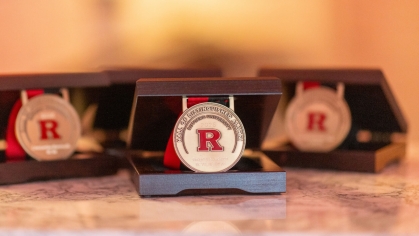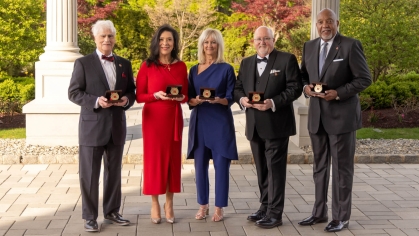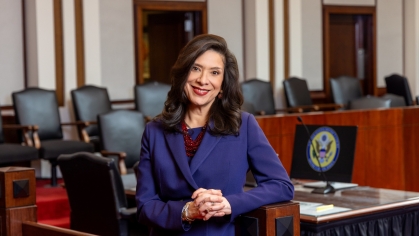A Magical Career
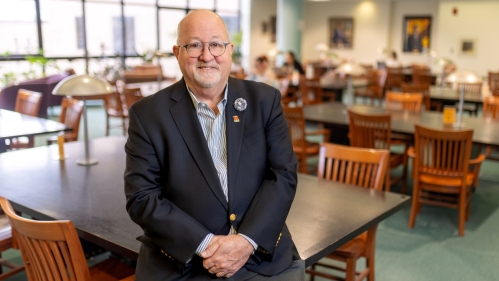
Rutgers Law School alumnus Donald Cameron Clark Jr. has won landmark court cases, established the Chicago Magic Lounge, produced plays and a film, and authored a book. The next stop on his fantastic life journey is induction into the Rutgers Hall of Distinguished Alumni on April 24.
A wall of washing machines with full loads tumbling in rhythmic circles may puzzle first-time visitors to the Chicago Magic Lounge. On closer inspection, an inconspicuous door offers entrance to this artfully lit 1930s-style speakeasy cabaret theater and bar.
The evocative space once housed a commercial laundry servicing Chicago hotels. Many of the theater’s performances feature Chicago-style magic, which relies on sleight of hand and a magician’s skill with cards, coins, a rope, or a ring.
“It's not ‘saw woman in half,’” says Donald Cameron Clark Jr., a Rutgers alumnus who is co-owner of the theater. “It’s magicians coming to your table or your bar stool and performing card and coin tricks and blowing your mind because they’re only two feet away from you.”
Clark didn’t start out with dreams of magic. Growing up in the suburbs of Chicago, he wanted to be an attorney and was drawn to the competitive, adversarial aspect of trials.
“I'm a big believer that truth—or at least a better understanding—comes out of competing ideas,” he says. “That's why I thought law, especially litigation, provided the best opportunity for me to not only enjoy a career, but also be able to advance ideas and points of view I was invested in.”
The breadth of possibilities for his future was not initially clear to him. “It may have been my own myopia, but when I went to law school, I thought ‘I can be a clerk for a judge, I can work in a large law firm, or I can hang a shingle. Those are my options.’”
But Clark’s vision expanded dramatically during his 36-year year legal career, which included being a Fortune 500 litigator, pro bono defense attorney who overturned a capital murder conviction and death sentence in Alabama, and serving as general counsel for the United Church of Christ.
After retiring from law, he didn’t rest on his laurels. In addition to developing the Chicago Magic Lounge, he became a producer of plays on and off Broadway and a film.
“Understanding that life is a journey, we don’t always know where that path is going to take us next,” Clark says.
A Storied Law Career
Clark met his future wife, Ellen, when they were undergraduates at Williams College in Massachusetts in the early 1970s. As graduation neared, they applied to schools with a law school and a library science school. The couple married in August 1976, shortly before Clark started Rutgers Law School in Camden.
Rutgers Law was a perfect fit. “It was about teaching how to think like a lawyer and not simply passing on the substance of laws, statutes, rules, and regulations,” he says. “It was teaching an analytical approach, and a way of thinking and processing legal issues and problems.”
After earning his juris doctorate in 1979, Clark and Ellen, who had earned a master’s degree in library science from Rutgers, returned to Chicago where he began his storied career. He worked for two of the city's largest law firms—Isham Lincoln & Beale and McDermott Will & Emery—before hanging his own shingle.
Early in his law career, Clark took on the complex pro bono case of an Alabama man convicted of murder and sentenced to die in the electric chair. With Clark’s representation, the conviction and death sentence were overturned. Years later, Clark wrote a book about the experience, Summary Judgment: A Lawyer’s Memoir, which was published in 2021.
In the latter half of his law career, he served as general counsel for the United Church of Christ, a tenure that included winning a landmark lawsuit in federal court in 2014 that declared unconstitutional a North Carolina law banning clergy from performing same-sex marriage ceremonies.
“The First Amendment, as well as all the Bill of Rights, is really about protecting fundamental freedoms of those who don't find themselves necessarily in the majority, striving for justice, striving for equality, striving for equal treatment under the law,” Clark says.
Finding Magic
The year following that case, Clark retired from law. He gave himself one year without starting anything new to see “if my next thing would find me instead of me going to find it.”
To maintain his law license, he attended continuing education courses at an American Bar Association convention in Chicago. Because as a young man he had enjoyed performing magic tricks at his sister’s birthday party, he searched for “magic in Chicago.” There he discovered an earlier iteration of the Chicago Magic Lounge.
Clark attended and thought the performance was great, but he knew it could be greater with its own venue to control the food, alcohol, and box office. He approached the producer and “after some conversation, shared interest, and shared ambition, we decided to take it to the next level.”
The club launched at its present site in the old commercial laundry in 2017 and has been a tremendous success in business and personal satisfaction. “I consider the Magic Lounge an intellectual enterprise and a communication enterprise,” he says. “Through intellect and communication, it is trying to move a person. And it does that every night. The smiles, the tears, the laughter—it’s fantastic.”
While invigorating the magic lounge, Clark expanded his entertainment portfolio to produce stories for the stage and screen. Those credits include the off-Broadway dramatic comedy Another Shot and the movie Guest Artist, the latter of which was written by and starred three-time Golden Globe nominee Jeff Daniels.
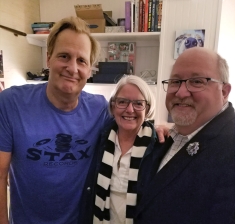
Giving Back to Rutgers
As fulfilling as Rutgers Law School was, Clark says his most rewarding experiences there have been as an alumnus working with and mentoring students.
“After having practiced law for a while, I wanted to bring some ‘been there, done that’ information to students on the brink of ‘going there and doing that,’” says Clark, who has taught as an adjunct faculty member. “I worry about law students pigeonholing themselves. Bringing some of those life lessons back to students is helpful.”
In addition to giving back to Rutgers through supporting students in the classroom, the Clarks have been generous donors. The commons area on the third floor in the Rutgers Law building in Camden is named for Clark, as is the annual Donald C. Clark Jr. Endowed Law and Religion Lecture. Their support also includes the Ellen Boates Clark Endowed Fellowship at the School of Communications and Information at Rutgers–New Brunswick.
His relationship with Rutgers “was not a one-and-done relationship where I put in three years in law school and then walked away. I didn't walk away from Rutgers, and it’s never walked away from me.”
For His Next Trick
So what’s next for this lawyer/producer/magic club owner?
“At this point in my life, I resist having a fixed path or destination,” he says. “I'm about taking in the scenery as it comes and making decisions as to what fork in the road I’m going to follow in the moment.”
Clark is one of five new inductees who will be formally enshrined in the Rutgers Hall of Distinguished Alumni in a ceremony starting at 6 p.m. Thursday, April 24, at The Palace at Somerset Park in Somerset, New Jersey. Registration for the ceremony closes on April 10. For more information, visit the Hall of Distinguished Alumni page.
Nominators’ Remarks
“In our quest for excellence at Rutgers University–Camden, we produce many outstanding graduates, and it is easy to count Don Clark among the best, brightest, and most accomplished of our alumni. When asked to do anything for Rutgers, the answer has always been a resounding yes, and whatever Don is involved in will be at the highest level of professionalism and standard.” —Antonio D. Tillis, chancellor, Rutgers University–Camden
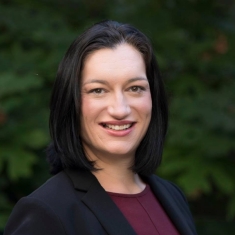
“Don is among those who left the greatest impression on me as a young professional on the importance of doing well and doing good in the world. Through his tireless commitment to excellence as an attorney, and a deep love and appreciation for the role Rutgers played in his life, Don embodied the values that define a Rutgers education.” –Christen Conaway Jones CCAS’07, director of development, The Pennington School

WE ARE YOU is an ongoing series of stories about the people who embody Rutgers University’s unwavering commitment to academic excellence, building community, and the common good.
Support Excellence
Consider a gift to the Scarlet Promise Initiative funds.
